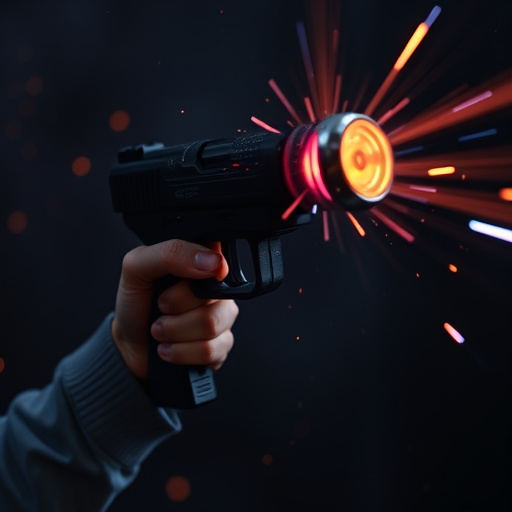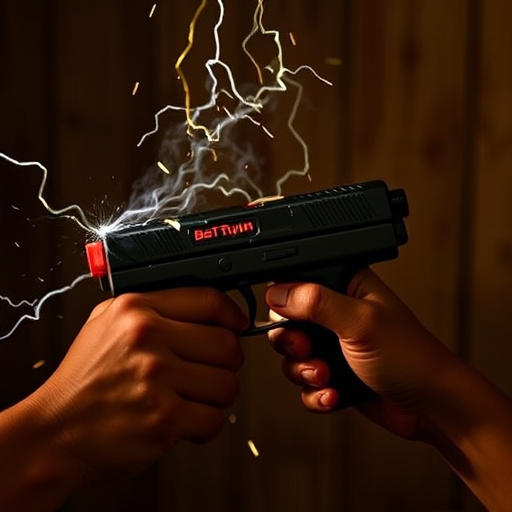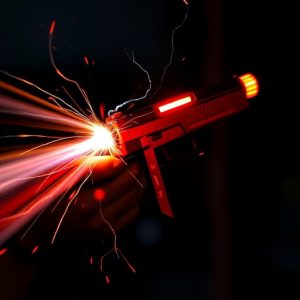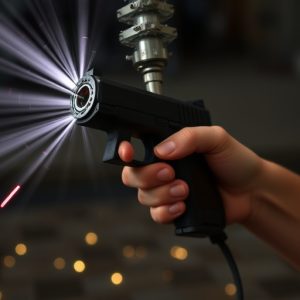Civilian Taser Laws: Requirements & Debunking ‘Knockout’ Myths
This text explores the legal aspects of civilian stun gun (taser) ownership in the US, emphasizing t…….
This text explores the legal aspects of civilian stun gun (taser) ownership in the US, emphasizing that while they are marketed as instant incapacitators, they only cause intense pain and temporary muscle paralysis. State laws vary widely regarding ownership, with age restrictions, permit systems, and background checks, reflecting a focus on self-defense rather than control. Understanding these regulations is crucial for civilians considering stun gun ownership, as misinformation about their effects persists.
In today’s world, civilian taser ownership is gaining attention, sparking debates about safety and regulation. This comprehensive guide explores the legal aspects of acquiring and possessing stun guns, focusing on state laws and requirements. We demystify these powerful devices, addressing common concerns, including whether stun guns can truly ‘knock you out’. Understanding the regulations and the technology behind these tools is crucial for informed decisions regarding self-defense options.
- Understanding Civilian Taser Ownership: A Legal Perspective
- What is a Stun Gun and How Does it Work?
- State Laws Regulating Taser Possession for Civilians
- Requirements for Acquiring a Taser Legally: A Breakdown
- Can a Stun Gun Knock You Out? Debunking Myths
Understanding Civilian Taser Ownership: A Legal Perspective

Understanding Civilian Taser Ownership: A Legal Perspective
In the United States, the ownership and use of stun guns, or tactical electronic control devices (ECDs), are regulated at both federal and state levels. While federal law allows individuals to legally purchase and possess stun guns for self-defense purposes, state laws vary significantly regarding specific requirements. These requirements often include age restrictions, background checks, waiting periods, and permit systems. It’s crucial for civilians considering owning a stun gun to familiarize themselves with their state’s unique regulations.
The notion of a stun gun knocking someone out is a common misconception. Stun guns operate by delivering a powerful electrical shock that disrupts muscle control, causing the target to experience intense pain and temporary incapacitation. However, these devices are not designed to render victims unconscious; instead, they aim to disable individuals long enough for the user to escape or get help. State laws often reflect this distinction, focusing on regulating stun guns as a tool for self-defense rather than as a means of control or restraint.
What is a Stun Gun and How Does it Work?

A stun gun, also known as an electronic control device (ECD), is a non-lethal weapon designed to temporarily incapacitate a person through electric shock. Unlike firearms, stun guns do not fire bullets but instead use high-voltage, low-current electrical pulses to disrupt the muscles’ ability to contract, causing muscle paralysis and temporary unconsciousness. This disruption is achieved by delivering a powerful electric current across the body through two probe tips located at the end of the device. The shock from a stun gun can cause intense pain, disorientation, and even temporary loss of consciousness, making it an effective tool for self-defense against aggressive assailants.
While the idea that a stun gun can “knock you out” is prevalent in popular culture, it’s important to clarify that its effectiveness varies. A stun gun’s primary purpose is not to render a target unconscious but rather to immobilize them long enough for the user to escape or seek help. The intensity of the shock and its impact on an individual depend on factors such as the stun gun’s voltage output, the duration of the pulse, body size, muscle mass, and the specific nerve pathways targeted. It’s crucial to note that a stun gun is not guaranteed to knock someone out, especially in situations where the target has a higher tolerance to pain or is under stress, making it a tool for deterrence and control rather than complete incapacitation.
State Laws Regulating Taser Possession for Civilians

In the United States, state laws govern the possession and use of taser guns (or stun guns) by civilians. These regulations vary widely across states, ranging from strict restrictions to relatively lenient guidelines. Key aspects often include permit requirements, waiting periods, age limitations, and specific prohibitions in certain areas or for certain individuals.
Understanding these state laws is crucial since a stun gun isn’t merely a device; it’s a powerful tool that can temporarily incapacitate a person through electric shock. The effect of a stun gun knock-out varies; while it aims to disable an assailant without causing serious harm, the intensity and duration of the shock can vary, leading to temporary paralysis or disorientation. Thus, civilian access is carefully regulated to ensure responsible use and public safety.
Requirements for Acquiring a Taser Legally: A Breakdown

Acquiring a taser for civilian use is subject to strict regulations, with each state having its own set of requirements and restrictions. Before considering owning a stun gun, it’s crucial to understand these laws to ensure compliance and safety. The first step involves checking your state’s definition of a stun device or taser, as different states have varying classifications, which can impact the acquisition process. Some states may require a permit or license for possession, while others only mandate age restrictions.
One common requirement is proof of training or certification in the safe use of stun devices. This ensures users understand the weapon’s capabilities and limitations, including whether a taser can truly knock someone out—a common misconception. It’s also essential to verify any waiting periods or background checks mandated by state law before purchasing a taser legally.
Can a Stun Gun Knock You Out? Debunking Myths

Stun guns, or taser guns, are often marketed as effective self-defense tools that can incapacitate an assailant with a powerful electric shock. However, one common misconception is that these devices can knock someone out. It’s essential to clarify that stun guns do not put their targets into a deep state of unconsciousness like traditional knockout drugs or punches to the head might. Instead, they disrupt muscle control, causing the target to fall to the ground and temporarily lose balance and coordination.
The electric shock from a stun gun is designed to be painful but non-lethal. It delivers a high voltage pulse that disrupts neural signals to the muscles, resulting in intense spasms and disorientation. While it can leave an individual unable to fight back for several seconds, it does not cause loss of consciousness. The idea that a stun gun will instantly knock someone out is a myth; its effectiveness lies more in incapacitation than rendering its target completely unconscious.
Understanding the legal landscape surrounding civilian taser ownership is crucial for those interested in acquiring this personal safety tool. While stun guns, or tasers, offer a non-lethal means of self-defense, state laws vary widely regarding their possession. This article has explored the basics of taser functionality, dispelled myths about their knock-out capabilities, and outlined the varying requirements for legal acquisition. Remember that, in terms of does a stun gun knock you out, these devices are designed to incapacitate rather than render unconsciousness, with their effectiveness dependent on numerous factors. Always ensure compliance with local regulations before considering civilian taser ownership.


